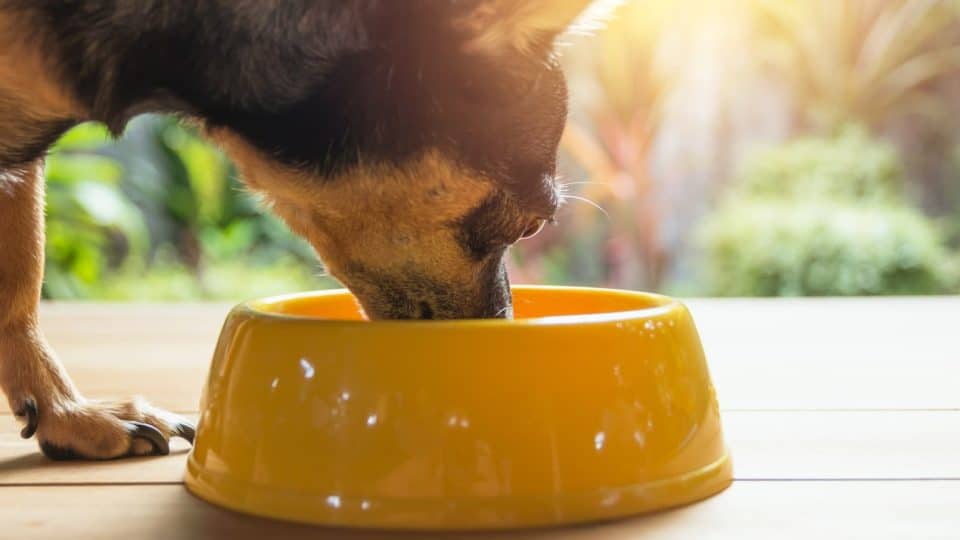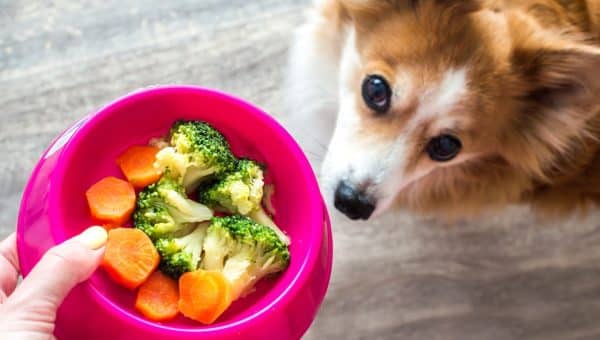- This post contains affiliate links. Read more here.
- Not a substitute for professional veterinary help.
Giving dogs bone broth is a feeding trend that has grown in popularity over the years. But this savory stock is anything but a food fad. Bone broth has been around for centuries! Although scientific evidence is limited, veterinary experts and pet parents praise bone broth as a dog superfood due to its various health benefits, including shinier coats, better immune health, and strengthening joints.
Bone broth is a nutrient-rich liquid made by simmering bones of beef, chicken, turkey, pork, or fish with meat scraps and connective tissue for a long period of time, says Dr. Amy Attas, DVM, and author of Pets and the City. She says this cooking process releases nutrients like minerals, collagen, gelatin, and amino acids from bones, resulting in a flavorful, nutritious broth to support good health.
We spoke with veterinary experts on the soup-er healthy and tasty bone broth, including its benefits and potential risks, how to incorporate it into your dog’s diet, and recipes to try at home.
6 Benefits of Bone Broth For Dogs
In addition to being appetizing for picky pups, bone broth offers the following benefits. However, more research is needed in general and in relation to dogs.
- It’s a good source of hydration. Bone broth has a high moisture content that is particularly beneficial for dogs who might not drink enough water, says Dr. Sabrina Kong, DVM, a staff veterinary writer at We Love Doodles. This can be helpful for dogs who are ill, recovering from an illness, or who need to increase their water intake.
- It’s rich in essential nutrients. This liquid is packed with amino acids, minerals, collagen, protein, and gelatin, which are beneficial to various body systems and promote overall health and wellness.
- It may promote joint health. The liquid contains glucosamine and chondroitin, natural compounds found in cartilage. Together, the two may strengthen joints and ease osteoarthritis symptoms.
- It may improve digestion. Studies on mice suggest that the gelatin and amino acids found in bone broth improve gut health by protecting a dog’s digestive tract’s mucosal lining and reducing inflammation.
- It helps support the immune system. It’s easy to see why some may coin bone broth as the chicken noodle soup for dogs. It’s warm, comforting, and helps them feel better.
- It can contribute to healthy skin and coat. Bone broth has lots of collagen, a type of protein that may benefit a dog’s skin and coat.
What are the Different Types of Bone Broth?
Dr. Attas says the types of bones and the animals they come from will affect the composition of the broth, its flavor, and its nutrient profile.
She breaks down different types of bones and their benefits:
- Large beef leg bones contain marrow, adding to the broth’s richness and flavor.
- When slow-cooked, the joints and cartilage from knuckle bones and poultry feet result in collagen and gelatin-rich broth.
- Meaty bones, such as oxtail, will contribute additional protein content to the broth.
- Chicken/turkey carcasses, necks, and wings provide protein but should not be cooked as long as larger mammal bones.
- Fish bones also require less cooking and must be strained from the resulting liquid.
She recommends using an array of bones for your bone broth for a well-rounded variety of nutrients.
What are the Potential Risks of Bone Broth?
While bone broth has its benefits and is generally safe, there are potential downsides to know before giving it to your dog. According to our experts, these may include:
- Harmful ingredients in store-bought broth. Bone broth for human consumption typically contains garlic and onions, which are toxic to dogs. Other potentially risky ingredients commonly found in bone broth include salt, spices, and preservatives. Dr. Gary Richter, MS, DVM, CVC, CVA, best-selling author and founder of Ultimate Pet Nutrition, recommends opting for organic bone broth and closely reading food labels to ensure they’re dog-safe. (One dog-safe option is A Pup Above’s bone broth.)
- High fat content. “Dogs with a history of pancreatitis should consume bone broth in moderation due to its fat content, especially if it is made from fattier meats and not defatted after cooling,” Dr. Kong says.
- Stomach upset. Dr. Attas says bone broth is rich and nutrient-dense, which may result in an upset stomach if too much is consumed at once. For this reason, introduce bone broth into your dog’s diet slowly.
- Bone fragments. Dr. Attas advises straining all broth and removing any bone fragments before giving it to your pup to prevent the risk of your dog accidentally ingesting them.
- Allergies. Does your dog have any food allergies, particularly to beef, chicken, or fish? Double-check the broth’s label to ensure it doesn’t contain any potential allergens.
How To Incorporate Bone Broth Into Your Dog’s Diet
As with any new food, it’s best to speak with a vet to determine whether bone broth is worth incorporating into your dog’s diet based on their needs. If so, gradually introduce it to avoid digestive upset.
“Pet parents can serve bone broth as a tasty topper over dry kibble, mixed into wet food, or alone as a hydrating treat,” Dr. Kong says. Additionally, Dr. Attas recommends not introducing any other new food at the same time as bone broth to observe whether it causes any adverse effects.
Lastly, Dr. Richter mentions that because bone broth spoils quickly, it should be used quickly if you purchase store-bought bone broth.
How Often Should Dogs Have Bone Broth?
Dr. Kong says the amount of bone broth a dog can have can vary depending on their size and dietary needs.
“There is no specific dosing for bone broth, but daily amounts could range from several tablespoons for very small pets up to one cup per day for giant dogs,” Dr. Richter says.
Dr. Attas advises starting with ⅛ a cup, or two tablespoons, of bone broth per 20 pounds of body weight per day. If well-tolerated, you can increase the amount to a ¼ cup, or four tablespoons, per 20 pounds per day.
However, if you notice signs of stomach upset, limit or eliminate bone broth from your dog’s diet.

iStock/Madeleine_Steinbach
Homemade Vs. Store-Bought Bone Broth
Are you trying to decide between making bone broth at home or buying it at the store? Here are the pros and cons of both to keep in mind:
Pros of homemade bone broth
- Complete control over the ingredients
- More economical
- Tailored to your dog’s taste preference
- Cooked and frozen in ice cube trays if made in large batches
Cons of homemade bone broth
- Time and effort to prepare and cook
- Stored and frozen if made in large quantities
Pros of store-bought bone broth
- More convenient and accessible
- Consistent quality and nutrient content
- Individually packaged with flavor varieties
Cons of store-bought bone broth
- Higher cost
- Risk for unwanted ingredients
- Less control over the source of the bones
“Whether choosing homemade or store-bought bone broth, it is paramount to ensure it is suitable for canine consumption,” Dr. Kong says. Fortunately, there are now many bone broth options for dogs in carton, pouch, powder, and food form.
How to Make Bone Broth at Home
Want to treat your pup to a delicious and nutritious home-cooked bone broth? Try these recipes from our expert dog check, Kiki Kane, and prepare to say “bon(e) appétit!”
Instant Pot Turkey Bone Broth for Dogs
- Prep Time: 5 minutes
- Cook Time: 4 hours
- Total Time: 4 hours 5 minutes
- Yield: 3 quarts
- Category: Meal mixers
Ingredients
- OPTIONAL: 3 turkey necks or 6 feet
- 1 turkey carcass
- 4 celery stalks
- 2 carrots or 1 cup baby carrots
- 1 cup roughly chopped fresh parsley or 1/4 cup dried
- 2 tbsp dried sage
- 1/4 cup apple cider vinegar
- Water
Instructions
If using the turkey necks or feet, you’ll need to roast them first.
Preheat oven to 400º
- Grease a roasting pan with olive oil and add the necks and/or feet. You can also add the veggies.
- Bake for 40-60 minutes until you get some nice color on the meat.
- Place the meat and bones in the Instant Pot, layering the veggies and herbs on top.
- Pour the vinegar over, then top up the bowl with water to the max fill line.
- Set the Instant Pot for 4 hours (240 minutes).
- After a natural release, remove solids from the broth with tongs.
- Pour the broth through a mesh colander into a bowl.
Place broth in the fridge until the fat rises to the top and the broth thickens. Overnight works great. Lastly, scrape the fat off the top of the broth and discard.
Serve broth warmed or cold over your dog’s favorite meal or just by itself. You can freeze it, too!
Instant Pot or Slow Cooker Beef and Pork Bone Broth for Dogs
- Prep Time: 5 minutes
- Cook Time: 5 hours
- Total Time: 9 hours 35 minutes
- Yield: 2-2.5 Quarts
- Category: Meal Mix-in
Ingredients
- 3 tbsp olive oil
- 2 pounds beef marrow bones
- 4 raw pig’s feet (not smoked)
- 8 celery stalks
- 4 carrots or 2 cups baby carrots
- 1 cup roughly chopped parsley
- 1/4 cup raw apple cider vinegar (some recipes suggest lemon juice but we do not recommend giving citrus to dogs)
- Water
Equipment
- Large roasting pan
- Instant pot, crock pot, or stock pot
Instructions
Place a rack in the middle of your oven.
Preheat oven to 450º.
- Grease a large roasting pan with olive oil, place your bone in the center, pig’s feet around the edges, and fill with the celery and carrots in the empty spaces.
- Bake the bones for an hour, flipping the bones and feet halfway through. If things are getting too brown too fast, turn down the oven or just skip straight to loading the Instant Pot.
- Put the roughly chopped parsley in the bottom of the Instant Pot or Crock Pot. Add the bones next, placing the marrow bones in the center and pushing the pig’s feet around. Top off with as much of the veggies as will fit, filling in some of the cracks. Add the apple cider vinegar, then add cold water, leaving an inch of space under the max fill line.
- Close and seal, cooking in manual mode for a maximum of 240 minutes (4 hours). If your pressure cooker only goes to 120, just run it twice.
- If you’re using a slow cooker, set it on low for 24-48 hours to get the maximum benefits of the recipe.
- If you’re using a stock pot on the stove, bring the broth to a simmer, stirring occasionally, then cover and simmer on low for 24-48 hours, checking the pot regularly to ensure the temperature is maintained and nothing is burning or sticking.
- Use a natural release, then turn off the heat. When the pot is cool enough to touch, you can use a small strainer to remove the larger piece from the broth. Then strain the broth through a fine mesh colander to catch any loose bone bits.
- Chill the broth in the fridge for a few hours or overnight until it (hopefully) sets into a gel.
Scrape the fat off the top of the gelatinized broth, pausing to appreciate how wiggly and jiggly it is.
Serve it up! You can freeze the broth, heat it up a little, and pour 1/4-1/2 cup over your dog’s kibble at mealtimes or serve it alone as a nutritious snack.
Takeaway
Bone broth can be a great addition to your dog’s diet when under the guidance of a vet or nutritionist. It’s flavorful and gives them an extra boost of nutrients. Other common food toppers, like blueberries, canned pumpkin, and eggs, are healthy and convenient dog-friendly foods you can use to add some variety to your pup’s daily meals and keep their tails wagging.





